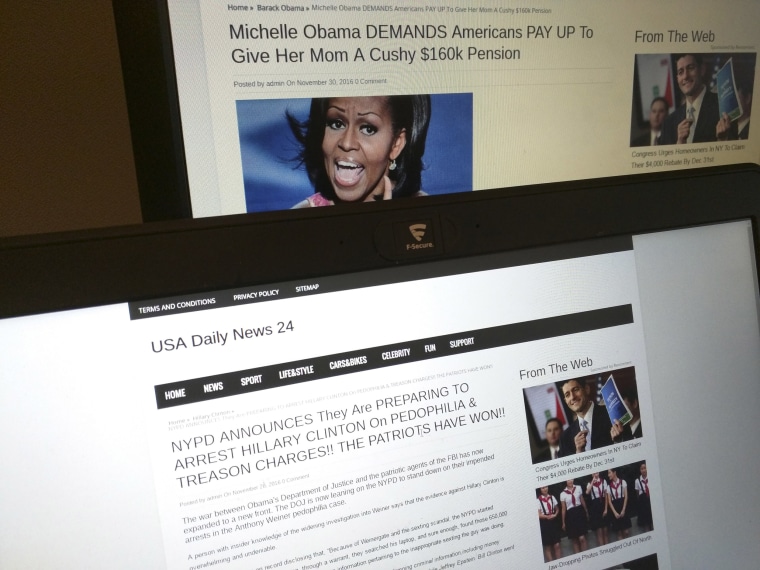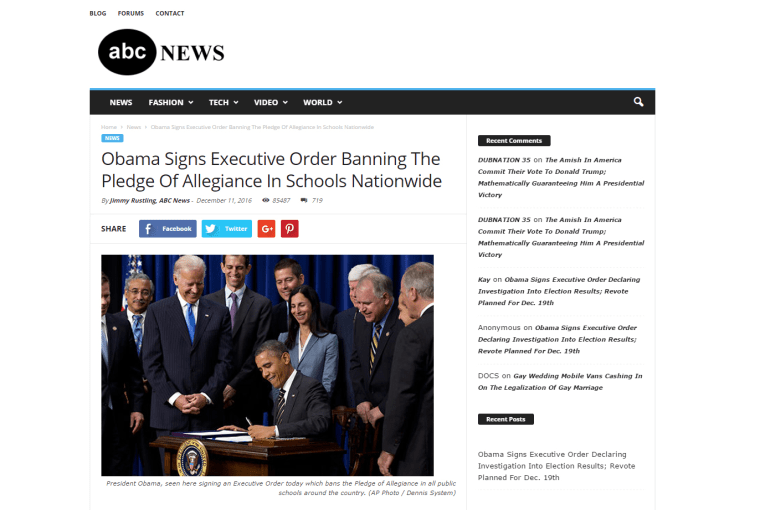Bogus stories about paid protesters and presidential endorsements made by the Vatican, among many other clickable tales, were not uncommon in the run-up to the general election this year, spreading like wildfire through social media. In the media’s soul-searching following the election, unsubstantiated stories and their purveyors were singled out, dissected and lumped together under the umbrella of “fake news.”

Now, some of the more artistic and comedic creators among the pure click-baiters are speaking out against the "fake" label and calling for a more nuanced approach. Many say they aren't doing fake news — they're doing satire.
“We get our news from Facebook, but we don’t fact-check what we’re reading, we don’t look into what we’re reading,” said John Egan, who runs The Burrard Street Journal out of Vancouver, Canada, and has published stories with headlines like "President Obama Confirms He Will Refuse to Leave Office if Trump Is Elected."
Related: How a Partying Macedonian Teen Earns Thousands Publishing Lies
Egan said his content is entirely satirical, but he is aware some people will share a story after reading only the headline.

"If you read any of the articles beyond a paragraph, you’re going to see it’s completely made up, totally fake ... it’s a complete joke,” Egan told NBC News, adding that the onus should be put on readers to seek out the truth.
Some of these readers, however, have a broader reach than others.
In October 2015, Fox News host Sean Hannity reported on air that 250,000 Syrian refugees were going to be settled in the United States. That same figure was also often quoted in speeches and appearances by then-presidential candidate Donald Trump.
"They shouldn't be brought here. You do things where you take care of the people, but I don't want 250,000 people coming into the United States,” Trump told Matt Lauer that same month.
But the apparent origin for that number was a story published a month earlier on the site Real News Right Now, titled, “U.S. to House 250,000 Syrian Refugees at Navajo, Standing Rock Indian Reservations.”
"We get our news from Facebook, but we don’t fact-check what we’re reading, we don’t look into what we’re reading."
The author of that piece, a 34-year-old Washington D.C. man who goes by the pen name R. Hobbus J.D., said he found this development “pretty wild and pretty shocking,” seeing how he had made the whole thing up.
“It’s upsetting because you would expect a presidential candidate to fact check and not spread false information,” he told NBC News on Monday.
Robert, who asked to be identified only by his first name, insists that what he writes on his website is obvious satire and he is “not actively trying to fool people or trick them in the way these other sites are doing now."
“I think the issue with the fake news that’s come about now is that it unfortunately kind of blurs the line between satire, hoaxes and fake news," Robert said, adding that he has begun adding links in his stories to actual news articles to drive the point home that what he does is not meant to be taken seriously.

Paul Horner, 38, who says he runs several high-trafficked websites, including NBCNews.com.co and ABCNews.com.co — which are spoofing real news sites like this one — said he doesn’t like being grouped with people who write fake news solely to be misleading.
Related: Facebook CEO Mark Zuckerberg Lays Out Plan to Combat Fake News
“They just write it just to write fake news, like there’s no purpose, there’s no satire, there’s nothing clever,” he told NBC News. "All the stories I wrote were to make Trump’s supporters look like idiots for sharing my stories."
Earlier this month, Google said it would ban websites that propagate false news from using its AdSense advertising platform. Facebook also updated its advertising policies to apply to fake news. And in an interview with "TODAY" last week, Facebook Chief Operating Officer Sheryl Sandberg acknowledged "there's a lot more to do."
Horner said he is worried his sites would get lumped into the same category, hurting his bottom line. At one point, he said he made about $10,000 from advertising.
"If you read any of the articles beyond a paragraph, you’re going to see it’s completely made up, totally fake ... it’s a complete joke,"
More established satire sites like The Onion have fooled people on Facebook before and foreign countries too, but the rise of maliciously fraudulent stories has caused people who traffic in comedic exaggeration to tweak their editorial strategy.
"This has actually been great for business from our perspective," Jack O'Brien, the editor-in-chief of Cracked.com, told NBC News.
According to O'Brien, Cracked — which often uses comedy to lampoon and debunk media myths — enjoyed its two best traffic days immediately after the election in part because audiences were in desperate need of comedic relief.
In the aftermath of the general election, O'Brien said he called Cracked's editorial team together and encouraged them to seek out under-represented communities to be featured on the site — and to be even more rigorous with their fact-checking.
"We try to provide thoughtful commentary in a fun way that isn’t alienating either side or will at least equally alienate each side," said O'Brien, whose editorial team represents a wide range of political viewpoints.
That said, he isn't above picking a fight with the president-elect (à la "Saturday Night Live") if it means more exposure and influence.
"Trump over the next four years is going to spend a lot time beefing down, and I think it will be good for whoever can manage to piss him off," he said. "We’ll certainly be trying our level best."

